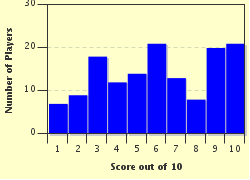Quiz Answer Key and Fun Facts
1. Feste appears in this comedy, where he sings for Countess Olivia and Duke Orsino. He criticizes both of their approaches to love, either directly or through lyrics in the songs he sings. Which Shakespeare play is this?
2. Touchstone is the jester for Duke Frederick in this comedy. He falls in love and later marries Audrey. Which play is this?
3. This play is Shakespeare's longest and features The Gravediggers and the deceased Yorick. The Gravediggers discuss Ophelia and then talk to the dialogue character. The Gravedigger then discovers Yorick's skull. Which tragedy is this?
4. Trinculo, servant of Alonso, is seen with Stephano and Caliban in which Shakespearean play?
5. Which play with a repetitive title does Pompey the fool appear in?
6. The jester Falstaff appears in three Shakespeare plays and his death is mentioned in another. Which of the following is NOT one of the plays he appears in?
7. This fool doesn't have a name. He often criticizes his master, yet at times guides him and acts as his conscience. He mysteriously disappears after Act III Scene VI, after the line "And I'll go to bed at noon". What play does the Fool appear in?
8. Launce and Speed appear in this early Shakespearean comedy. They are mischievous youngsters who provide plenty of humour. Which play is this?
9. These fools also come in a pair: the identical twins Dromio appear in which Shakespeare play?
10. Which Shakespeare play do The Clown and Autolycus appear in?
Source: Author
AdamM7
This quiz was reviewed by FunTrivia editor
looney_tunes before going online.
Any errors found in FunTrivia content are routinely corrected through our feedback system.

